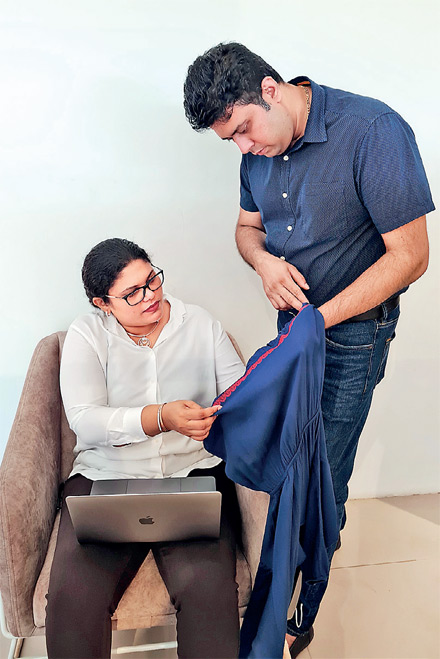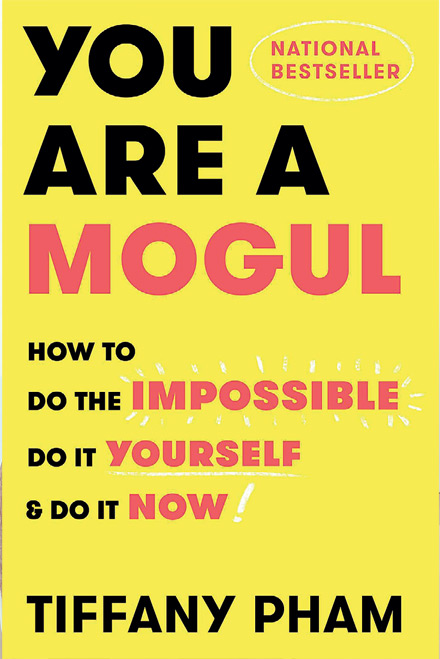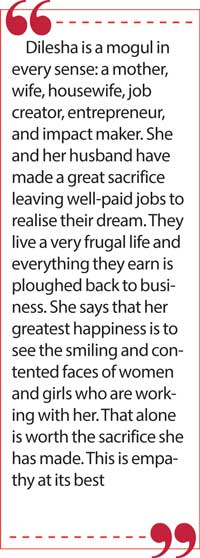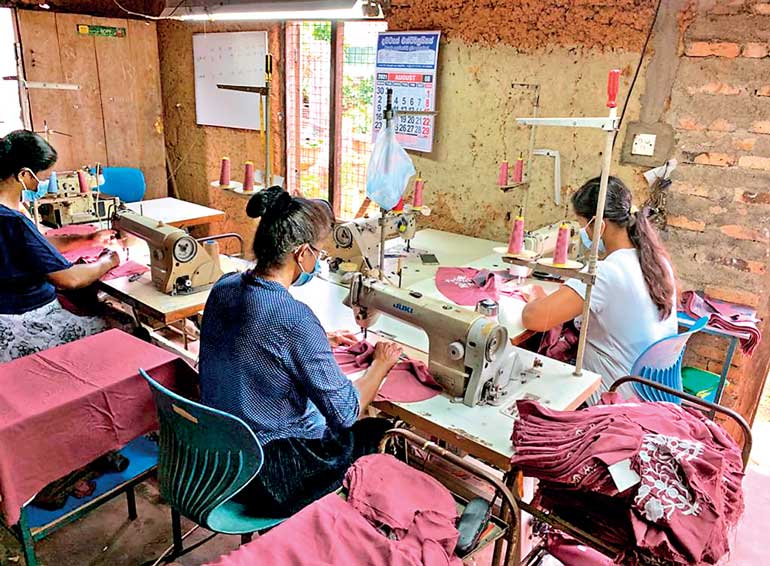Wednesday Feb 18, 2026
Wednesday Feb 18, 2026
Monday, 16 August 2021 00:10 - - {{hitsCtrl.values.hits}}

Dilesha and Suneth discussing a business plan

Title of the book ‘You are a Mogul’
 Every woman is a mogul
Every woman is a mogulTiffany Pham, creator of platform Mogul (available at: https://onmogul.com/) for women throughout the globe to develop their entrepreneurial skills, has shared her professional experiences in the form of a semi-autobiography, ‘You Are a Mogul’, released in 2018. The sub tagline of the book tells it all: ‘How to do the impossible, Do it yourself, and Do it now’.
Created in 2014 when Pham was 27 years old with her ICT geek brother David Pham, Mogul has attracted women throughout the globe in large numbers. Mogul, derived from India’s Mogul Empire, usually refers to a man doing business well. Pham has thought that it should be extended to women and according to her, every woman is born with Mogul qualities. That is how her semi-autobiography has earned its name.
I found such a Mogul in Sri Lanka who has not formally joined Pham’s Mogul platform. She is Dr. Dilesha Perera, founder of Dilchand, a small apparel manufacturing company, and the brand name La Vivente. It is a business started from scratch with her banker husband Suneth Korala taking Sri Lanka’s quality apparels to the global markets. They have adopted a novel production and marketing approach to operationalise their startup.
The enterprising university student
I met the wide-eyed young Dilesha in 2004 when I was doing some visiting lectures in development economics at the University of Sri Jayewardenepura. She was reading for an honours degree in commerce specialising in international trade. She walked into the first lecture just in time having parked her car outside the lecture room. I was curious because in those days it was rare that a university student, especially a girl, drove herself to the Uni in a car. During the mid-lecture tea break, I asked her about it.
She reluctantly revealed that she was in business, and that business involved delivering readymade garments to major shops in the city. For that, she needed a car. I was impressed because when university graduates were marching in streets demanding for government jobs, here is a girl who has started a business while she was still studying in the university. I recall telling her that she would one day become a great businesswoman. Dilesha has now proved my prediction.
Development of an enterprising woman
Since then, I have watched her grow, mature, and develop as a professional woman. In 2005 at the General Convocation of the Institute of Bankers of Sri Lanka of which I was the Chairman, she walked the stage in front of me having earned her Diploma in Banking and Finance. That diploma, accredited by UK’s Institute of Financial Services, was the passport for her to get the Associate Membership of both institutes. Then, in 2015, I met her at an educational function, and she told me that she was the manager of an international bank in Colombo and had already completed an MBA from the University of Kelaniya.
She had big plans for her future. She wanted to develop her business on a full-time basis and complete a doctorate in business administration at the same university. When I met her again a week ago, she had globalised her business in a small way, completed her doctorate, and was serving as Secretary of the Colombo Chamber of Commerce. We had a long chat about how she has progressed so far and how she would develop it in the future.
A frugal beginning
“I don’t come from a rich family,” Dilesha told me. “We belonged to lower middle class. My Dad ran a small grocery shop in the place and my mom was a housewife. I was the only child in the family. My parents wanted to give me the best education. So, with great difficulty, they got me admitted the Musaeus College. I did my A-Levels there and entered the University of Sri Jayewardenepura to read for an Honours degree in commerce. As you know I completed that degree in 2004.” That college was the dream of any parent to have their daughter schooled.
Grabbing a business opportunity
While at the university, she had been working at a bank. One of her customers had offered her a business opportunity involving the distribution of stock lots of garments among the city’s clothing stores. The entrepreneurial woman in her had forced her to take it without thinking twice. She had thus got into two day-time jobs, and one evening engagement as a student, an impossible task for a girl of early 20s. But she was determined and kept on moving forward.
This was typical of a mogul, according to Pham. She has asked Moguls not to waste extra hours and use them productively to gain experience, improve learning, and build networks. This is her advice to them: “Take advantage of your extra hours if you are still dreaming of your ideal job. Those hours are waiting for you to fill them with interesting connections, learning experiences, and opportunities that will open doors. Don’t be afraid to teach yourself the skills you need to succeed.” This is an exhausting journey along a rugged path. But Dilesha willingly took it.
 A partner in life and in business
A partner in life and in business
How did you get this idea of starting your own business? I asked her. She offered me her broad smile. “I’ve been harbouring this idea even when I was at the university,” she started her narration. “But it blossomed to a reality when I met my husband, Suneth, at banking classes in 2005. We fell in love because both of us had the same world view, ambition, and desire to do something different. Two years later we were married. But we spent our time day and night thinking, planning and strategising how we should commence a business of our own. So, it was conceived together.”
Life partner should be a fortune bringer
Normally a male mogul might say that his fortunes started smiling on him after he got his wife. But here is a female mogul telling me the opposite. However, it is perfectly in accord with what Pham has recommended to her Mogul followers. In the chapter titled ‘Accelerate your Success with the Right Partner’, Pham has said: “The ideal is to have someone who is a partner in the truest sense, so that you are pushing each other forward, supporting each other’s dreams and allowing each other to dream bigger because you are by each other’s side.”
Dilchand, the women’s wear manufacturer
“Did you coin the name Dilchand by combining the names of you both?” I asked her. “No, no,” she corrected me. “It’s a combination of my two names, Dilesha, and Chandima. It was his suggestion that we do it that way because there was a feeling that the success of our business will come from my full involvement in it.”
Brand name La Vivente
They set a two-stage plan to realise their dream. First. Dilesha will leave her senior position in the international bank to devote full-time for the business which had been started in 2009 in a small way. She will use the spare time to complete her doctorate at the Kelaniya University. Suneth will continue in his bank and provide her with side support. When the business progresses to a certain degree of maturity, he too will leave the bank and join her full-time. This was how the apparel business Dilchand Private Limited was born offering to the market women’s and teens’ clothes and footwear under its brand name La Vivente (accessible at: https://lavivente.lk/).
Dilesha, the life giver
Her brand name sounded like a mixture of Latin and French. Why did she select this unfamiliar brand name? I was curious. “It comes from French and was suggested to me by a family friend who was well-versed in that language. It means living or life and has two applications. One is that every woman who dresses herself elegantly is living. The other relates to the business model that we’ve started. In that business model, we have engaged many small-scale entrepreneur women as our suppliers of finished products. We’ve given them, their families and those they have employed a new life. Therefore, those who wear La Vivente dresses and footwear can be proud of being a partner of a large project in which life is sustained. Besides, when we go to the international market, this brand name comes in handy,” said Dilesha.
Empowering women
It makes sense. But what is this business model she is talking about? What is its specialty? I asked her. “Right at the beginning, we realised that we cannot depend on the stock lots of large manufacturers because there was a cut-throat competition. We’ve to manufacture our own products, based on our own unique designs. But to start a big factory requires money and we didn’t have that money with us. We had long discussions over it and finally settled for a new model in which goods are supplied to us by a team of subcontractors.
We decided that those subcontractors should be women who are desirous of earning an income for their families. If we can empower them entrepreneurially, as some economists would say, they would become our most important asset. So, we tested our strategy by engaging a woman to begin with. The problem was she didn’t have an industry grade sewing machine. She also didn’t have technical knowhow to stitch garments that could be sold in the market.”
Advancing seed capital to women partners
How did you resolve the problem? I asked her. “We had very small savings and decided to advance her some money. She could use it to buy a sewing machine and fabrics for sewing. It was done purely on trust and there was no written contract. She was supposed to repay it gradually by delivering stitched clothes. These women are very reliable. She grabbed the opportunity just like a duck placed near water.
“And the clothes she delivered were of very high quality with no defects. It was a success and we’re happy that we provided livelihood to a poor family. This was a kind of a social enterprise which was just conceived in my mind. We extended it gradually to others. Now we’ve about 100 such women entrepreneurs on our supply roll.” Economists call this advancing seed capital to business startups.
Dilesha, the social entrepreneur
‘Social enterprise’ is a concept developed in the UK in late 1970s providing an alternative to the existing business model. Its aim was to generate the biggest social wellbeing by engaging citizens as development partners. It therefore eliminates the division of citizens as masters and workers. All are owners of society’s common capital. Later, Nobel Laureate Muhmmad Yunus of Grameen Bank fame popularised it as social business. Now a Sri Lankan Mogul has practically applied this concept to her startup business. And she has done it successfully.
Through this model, she has built not only financial capital but also what is known as social capital, networks of human beings working for a common goal. In financial crises, financial capital melts away, but social capital remains intact. Hence, the stability and viability of the business world depend not on financial capital but on social capital. In this context, Dilesha’s strategy of building social capital through social enterprise will pay her dividends in the long run.
Online marketing
Dilesha has completed a master’s degree as well as a doctorate in business administration specialising in marketing. So, she must be using a novel marketing strategy to sell her products. I asked her about it. “We’re selling our products in our retail shops as well as online. During this COVID-19 pandemic, people’s mobility has been restricted. Therefore, our retail shops are poorly visited. However, online sales or e-commerce have provided us with a great opportunity. Anybody can buy our products by visiting our La Vivente website.
We’ve given the option of returning the product if the customer is not satisfied. But there are only very few returns, less than even 1%. The online selling model has allowed us to go global too. We’ve got franchise holders in the Maldives, Australia and New Zealand. Customers can visit our website, place orders through our franchise holders, and goods are delivered to their doorsteps. So can the local customers. We use courier services to deliver the dresses they have ordered through the web. This has become a very effective marketing technique.”
Dream to make La Vivente the most preferred brand
I asked her about her plans for the future. Where will she place herself in five years? Or in 10 years? “We’re planning to penetrate the North American and European markets. Online selling will enable us to do it at lower costs. In 10 years’ time, I want to make La Vivente the most preferred brand in the world. That’s the greatest achievement that I can make as a businesswoman. I’m waiting for the realisation of that dream of ours,” she said confidently.
Knowing who Dilesha is and what her capacity and capabilities are and what sacrifices she is prepared to make to realise her dream, I know that this is a possibility. Her biggest strength is her husband who is always by her side. There is a popular saying that behind the success of every man, there is a woman, implying his wife. In Dilesha’s case, it is the opposite: Behind the success of Dilesha, there is her husband standing by her side always.
Empathy at its best
Dilesha is a mogul in every sense: a mother, wife, housewife, job creator, entrepreneur, and impact maker. She and her husband have made a great sacrifice leaving well-paid jobs to realise their dream. They live a very frugal life and everything they earn is ploughed back to business. She says that her greatest happiness is to see the smiling and contented faces of women and girls who are working with her. That alone is worth the sacrifice she has made. This is empathy at its best.
Let thousands of moguls blossom
This is the story of Sri Lanka’s Mogul who has not joined Tiffany Pham’s Mogul Platform. She does not have to, because she is one big Mogul herself. She has created hundreds of moguls in Sri Lanka. In the future, she will be creating them in thousands.

Women subcontractors working in their home environments
(The writer, a former Deputy Governor of the Central Bank of Sri Lanka, can be reached at [email protected].)